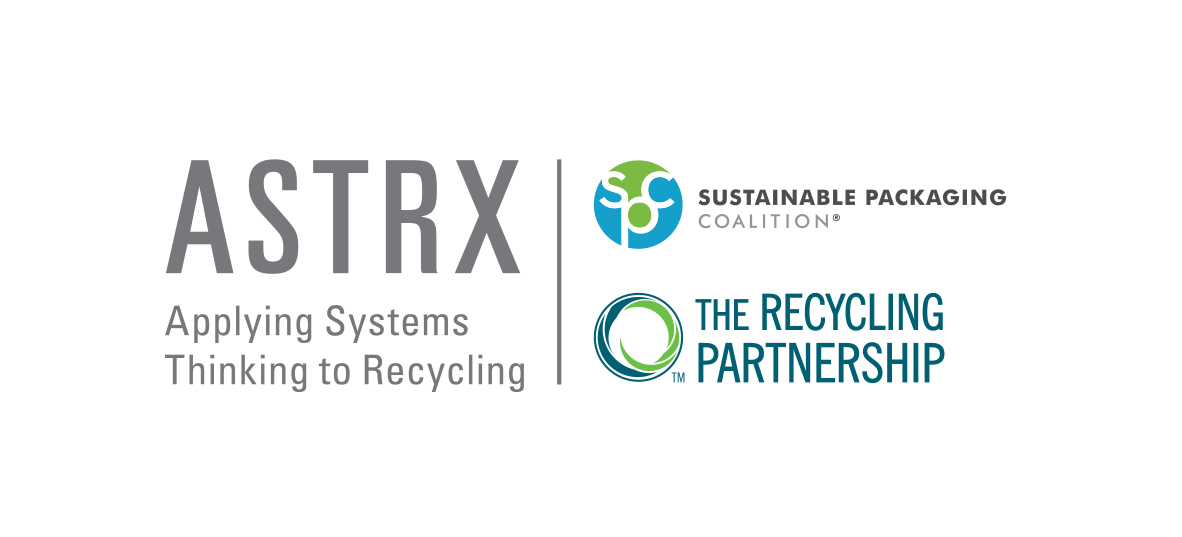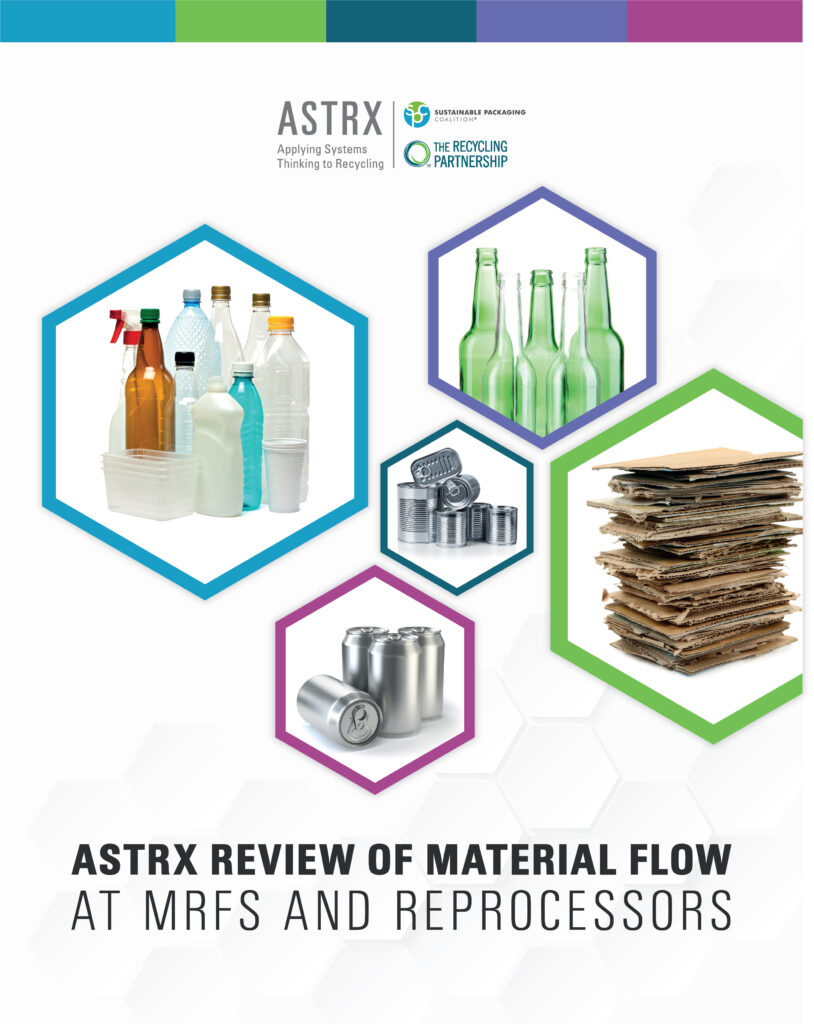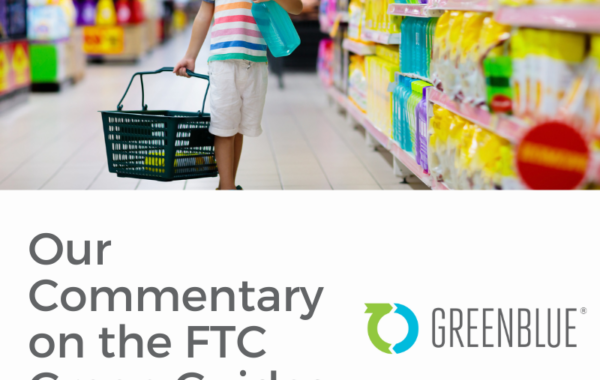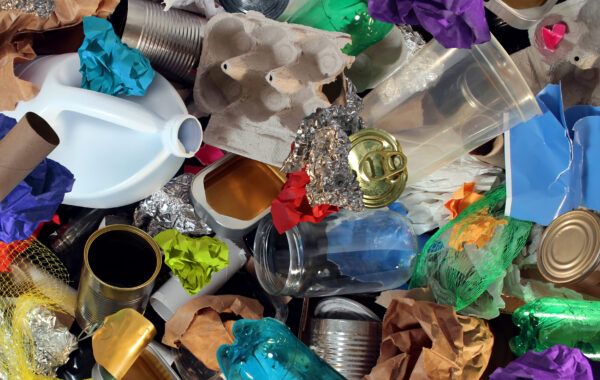June 12, 2019
The Sustainable Packaging Coalition & The Recycling Partnership studied how plastic, paper, glass, aluminum, cartons and steel packaging fared in material recovery facilities & reprocessor facilities
CHARLOTTESVILLE, VA (JUNE 11TH, 2019) — ASTRX (Applying Systems Thinking to Recycling), the joint project of The Sustainable Packaging Coalition® and The Recycling Partnership, has released The ASTRX Review of Material Flow at MRFs and Reprocessors. The report investigates how plastic, paper, glass, aluminum and steel packaging move through two critical pieces of the circular economy: material recovery facilities (MRFs) and reprocessors.
The objective of the study was to learn whether there are packaging types, materials or contaminants that present significant challenges for MRFs and reprocessors, where specifically within the system they cause problems, and why. The ASTRX team conducted interviews with MRFs across the U.S., plastics reclaimers, glass beneficiators, paper mills, aluminum mills and a steel broker.
“We hear a lot that certain types of packaging create problems for MRFs or reprocessors, but sometimes issues only occur sporadically or only in certain regions,” said Trina Matta, Senior Manager, Sustainable Packaging Coalition. “We wanted to know what was just a problem for a few facilities and what was truly creating a burden on the recycling system Our research identifies areas that are persistent, challenging problems in need of an intervention that could help the recycling system be more successful.
Some of the top takeaways for brand owners:
- Brand owners can help MRFs fund investments to assist in managing flexible films.
- Consider adding a How2Recycle® label on packaging to discourage contamination.
- Create packaging that can successfully navigate the recycling system.
- Purchase recycled content for packaging materials and durable goods to the extent possible.
- Be careful with shrink sleeves.
- Paper and aluminum design guides are needed.
“Recycling is not just putting a bottle, can, carton or box in a curbside cart, it’s a system that provides raw materials to a complex manufacturing process,” said Dylan de Thomas, VP of Industry Collaboration for The Recycling Partnership. “We wanted to provide a critical feedback loop from the facilities that are sorting and reprocessing the goods we put in recycling carts and bins across the country to the companies that are producing an increasingly complex packaging stream.”
Each section discusses findings from each material group, market characteristics of each material, information about how that material fares at the MRF and at the reprocessor, and recommendations for how to improve the recyclability of each material type.
The report is free to download on the ASTRX website. The report includes downloadable worksheets, a recording of a webinar discussing the report findings, and more!

About ASTRX
ASTRX (Applying Systems Thinking to Recycling) combines the SPC’s connection with brands and knowledge of sustainable materials with The Recycling Partnership’s expertise in local government recycling and the operation of material recovery facilities (MRFs). The combined expertise of the two organizations is applied to comprehensively map barriers and opportunities within the recycling landscape, and identify tactics to advance the industry and deliver more high-quality recyclables to the supply chain.
About The Sustainable Packaging Coalition
The Sustainable Packaging Coalition®, is a membership-based collaborative led by an independent nonprofit that believes in the power of industry to make packaging more sustainable. Using an objective lifecycle-based approach, we work in a constructive atmosphere to provide thought leadership and bring our members together to strengthen and advance the business case for more sustainable packaging.
For more information, visit www.sustainablepackaging.org or follow the SPC on Twitter @SPCspotlight
About The Recycling Partnership
The Recycling Partnership (recyclingpartnership.org) is a national nonprofit organization that leverages corporate partner funding to transform recycling for good in states, cities and communities all across America. As the only organization in the country that engages the full recycling supply chain from the corporations that manufacture products and packaging to local governments charged with recycling to industry end markets, haulers, material recovery facilities, and converters; The Recycling Partnership positively impacts recycling at every step in the process. The Recycling Partnership has served more than 1,000 communities and counting with best-in-class tools, data, resources and technical support, helped place 500,000 recycling carts, reached 50 million households, and helped companies and communities invest more than $37 million in recycling infrastructure.In doing so, The Recycling Partnership has created meaningful social, environmental, and economic change. By the end of 2019, the nonprofit change agent estimates it will have diverted 230 million pounds of new recyclables, saved 465 million gallons of water, avoided 250 thousand metric tons of GHG, and driven significant reductions in targeted contamination rates.






